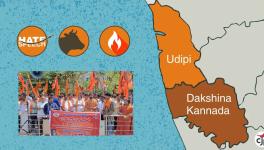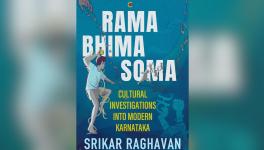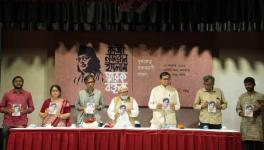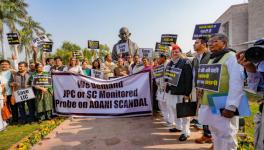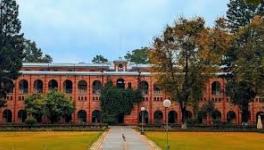CPI(M) Hosts Conference to Address Socioeconomic Issues Faced by Karnataka Muslims
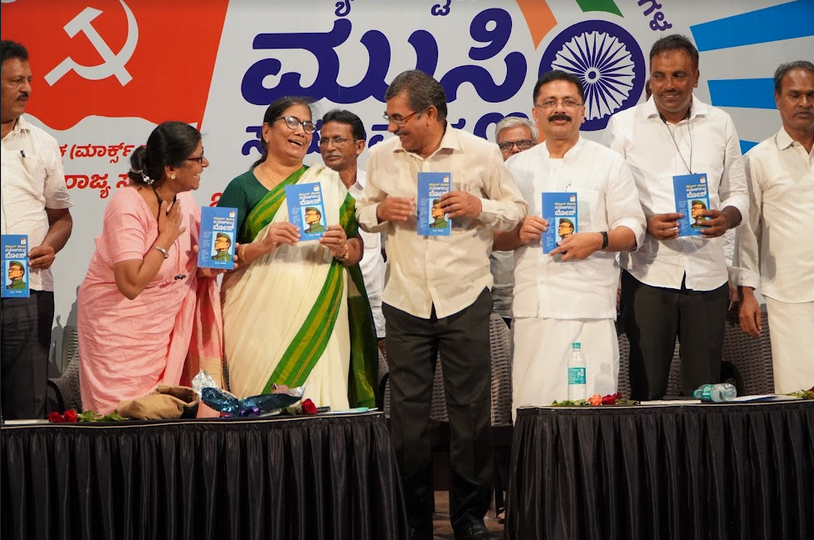
Starting May 31, 2022, CPI(M) hosted a 2-day conference on the issues faced by Muslims. The program was held in Mangaluru, Karnataka and saw over a 1000 delegates in attendance. The chief guest was KT Jaleel, former Minister for Higher Education in Kerala. Pictures by Nikhil Cariappa.
On May 31, the Communist Party of India (Marxist) hosted a two-day conference in Mangaluru on the issues faced by the Muslim community in Karnataka. The event was attended by more than one thousand Muslim delegates from across the state. The chief guest at the event was KT Jaleel, former Minister of Higher Education and member of the Legislative Assembly in Kerala. Other notable guests included Dr K Shareefa, a poet; Mavalli Shankar, state convenor of Dalit Sangarsha Samiti (Ambedkar Vada); BM Haneef, senior journalist; B Peer Basha and K Neela, noted writers; several teachers and activists. In the audience was Nabisab Killedar, the fruit vendor whose cart was vandalised by members of a Hindu extremist group in Dharwad.
KT Jaleel spoke about India’s history. He said, “The leader of the first war of independence was none other than Bahadur Shah Zafar. Until the moment he was exiled to Burma, he fought for the country’s freedom. After independence, Jawaharlal Nehru didn’t allow India to turn into a religious state. For instance, when he was inaugurating the Bhakra Nangal dam, he proclaimed that these dams were the temples of modern India because they were feeding crores of farmers. Subsequent governments also worked to keep India a secular state. Even Atal Bihari Vajpayee condemned the Gujarat riots in Parliament. But the present BJP (Bharatiya Janata Party) government is relentlessly oppressing minorities on the basis of religion, caste and even mode of dress.”
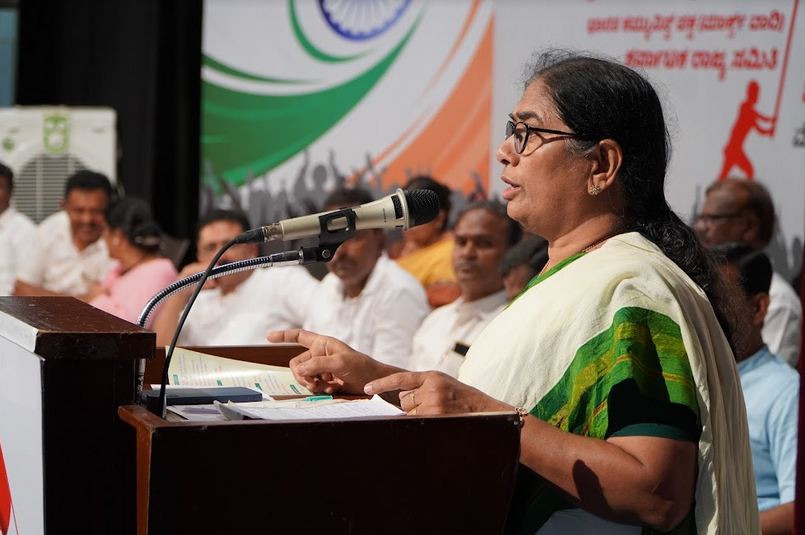
Writer K Shareefa also recalled incidents from the past. She said, “Muslims have shown remarkable patience in the face of persecution. However, religious organisations have not opposed anti-women ways. Oppression of women is happening within the community as well as from outside the community.” She continued, “Thirty years back, there was an incident in Bijapur. This is the story of Najma. She had gone to the cinema to watch a film. Men in the community tried to stop her from entering and decided that watching movies would corrupt women. The name of the film was ‘Khuda Gawah’. When she was stopped from going to the movie, she protested against it, saying that it was her right to watch it. Infuriated, the men picked up swords and threatened to kill her. She ran into a police station for protection. But the man came there and threatened to burn down the station. These were Muslim fundamentalists. We went there and ensured police protection for Najma. There are violent acts within our community as well. That too we have to confront.”
Some of the speakers referenced to the Sachar committee report, which notes how Muslims are in a worse economic state than even Dalits in various regions of the country. It was noted that Muslims require state assistance, and instead they receive state oppression. Muneer Katipalla, CPI(M) state committee member, noted, “Representation of Muslims is abysmal in education, government jobs, judiciary and legislature. For example, yesterday, a list of IAS and IPS officers was released. Out of 675 successful candidates, there were only 28 Muslims. A community which makes up 15% of the country has only 3% representation.”
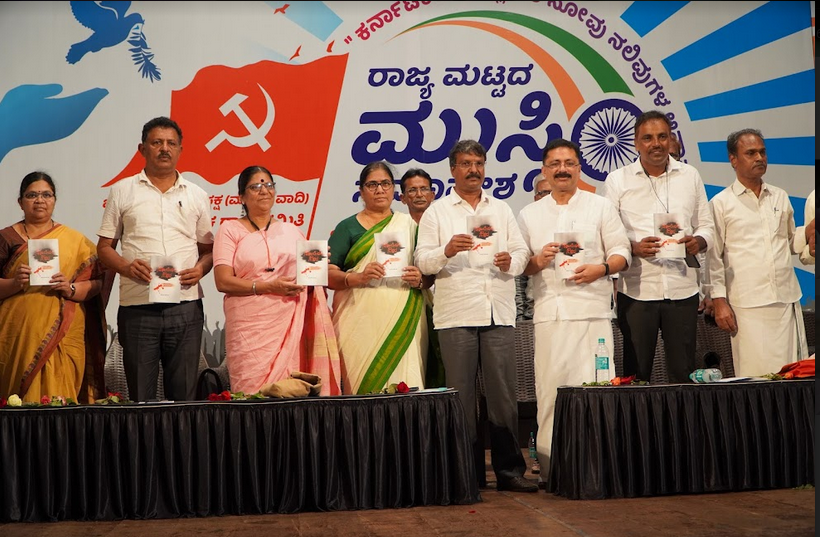
Senior journalist BM Haneef introspected on the mistakes made by Muslims in failing to acknowledge fundamentalism within the community, especially during the Hijab row. He said, “By protesting for the hijab in educational institutions, we (muslims) gave the Sangh Parivar what they wanted, on a platter.”
He also spoke about the diversity within the Muslim community, which is largely ignored. He said, “All communities should get equal representation in every state. Among muslims in Karnataka, various commissions have identified at least 17 sub groups based on profession. It is known that Dalits are made to clean toilets. However, if you go to Bijapur, you will find Muslim women cleaning toilets. That community is called Band. There are many other communities - Chaparband, Darvesh, Vakil, Nalband and more. These are the oppressed groups within an already oppressed community. They can be considered as castes. They are in need of help and facilities from the government. However, the government has created development commissions for Brahmins and other dominant castes.”
The most fiery speech was arguably delivered by writer K Neela. She acknowledged growing communalism among the minorities, however, she also warned that one should not equate it to the danger of majoritarian communalism. She said, “Everybody knows how the hijab issue in Udupi became so big. We know which organisation (referring to PFI) made it so big. Similarly, where the BJP is likely to lose, which party goes there to contest? Doesn’t AIMIM contest there? The threats of these organisations cannot be compared to the communalisation of the majority. However, communalisation of the minorities cannot liberate us. This message has to be taken to the people. During the NRC, CAA protests, when you felt the ruling class was conspiring to take away your voting rights and remove your citizenship, you allowed women to come out and protest in large numbers. Once that issue came to an end, you sent them back to the kitchen. This is not going to bring any change or liberation for us.”
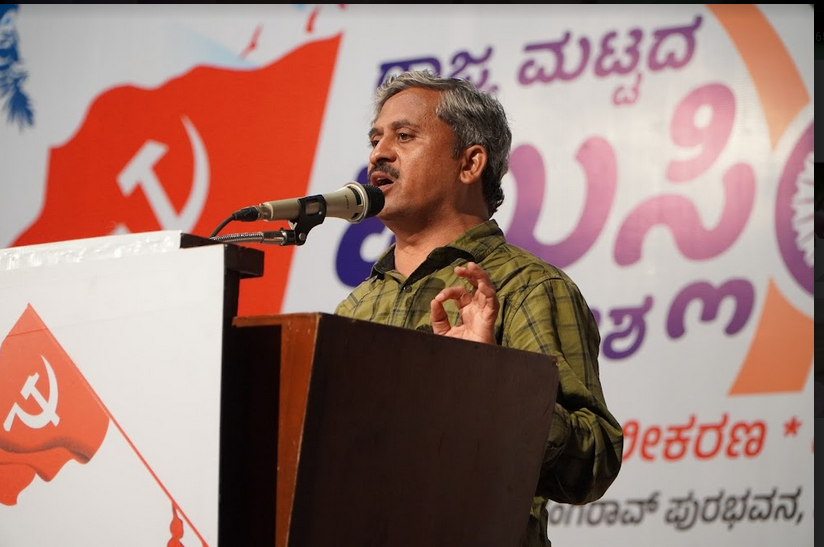
The program was concluded by songs and dances performanced by young boys of the beary Muslim community. The songs were sung in Kannada and Beary languages. Their songs were in praise of the nation as well as the almighty.
On Day two of the conference, a resolution was passed demanding that the government allocate funds in the budget for education, housing and social welfare to Muslims, in proportion to their population.
Get the latest reports & analysis with people's perspective on Protests, movements & deep analytical videos, discussions of the current affairs in your Telegram app. Subscribe to NewsClick's Telegram channel & get Real-Time updates on stories, as they get published on our website.










